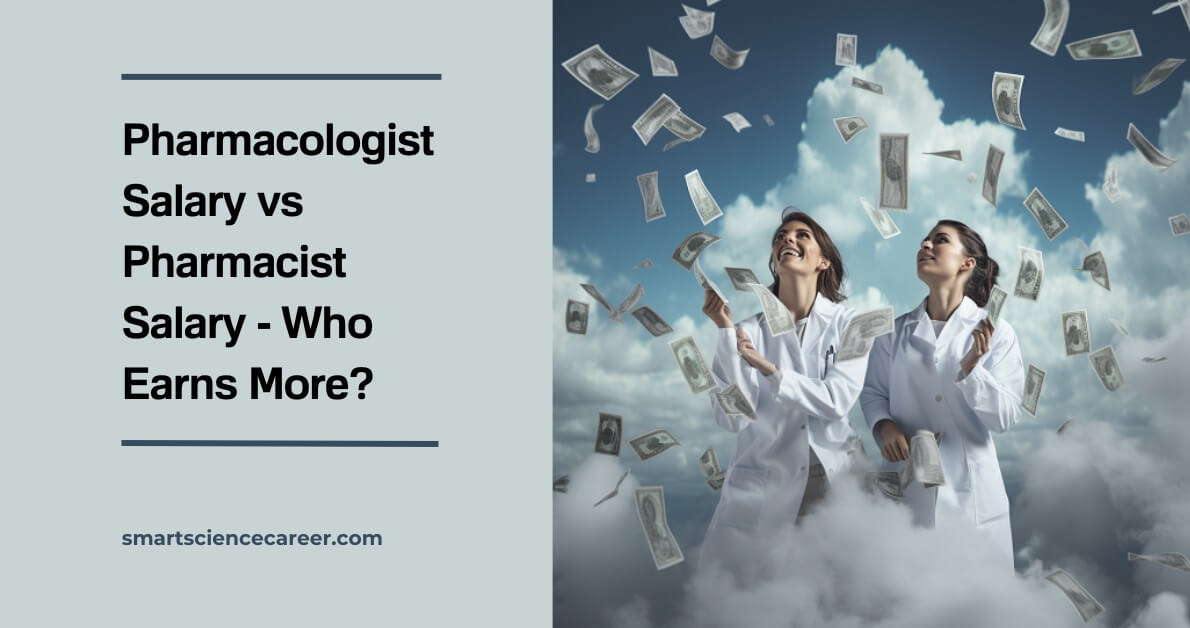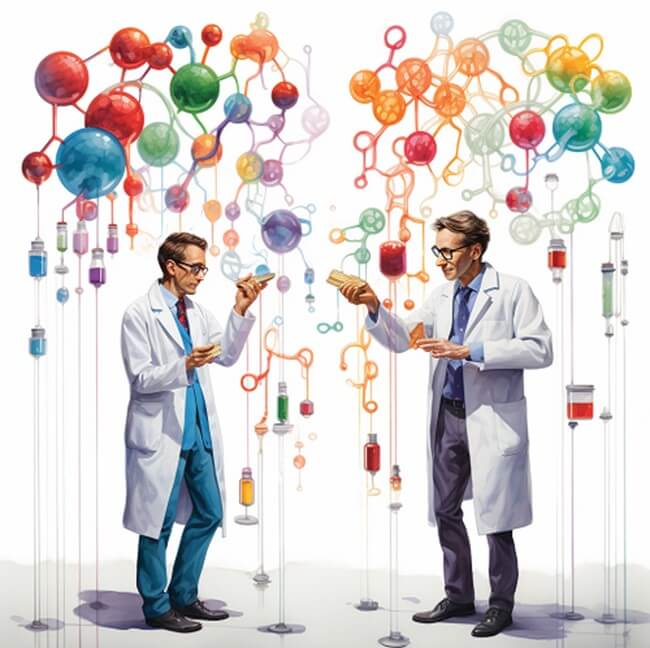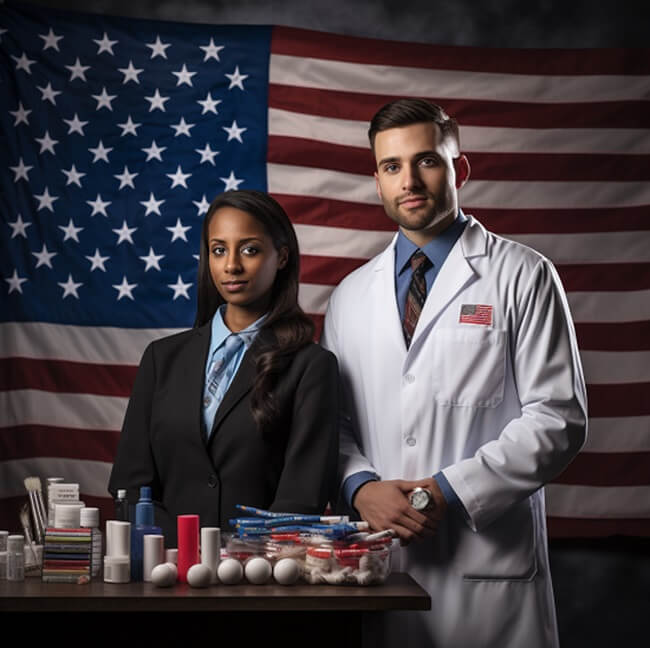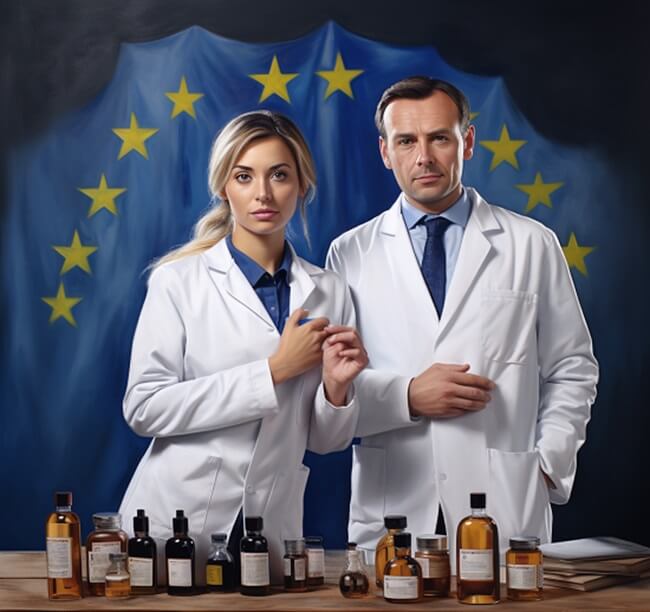Pharmacologist Salary vs Pharmacist Salary – Who Earns More?
Pharmacologists and pharmacists are both professionals who work in the field of drugs and medications. A pharmacologist is a scientist, while a pharmacist is a healthcare professional. Pharmacologists may have slightly higher salaries than pharmacists in some countries but have very different roles and responsibilities.
What is the difference between a pharmacologist and a pharmacist?
A pharmacologist is a scientist who studies the effects of drugs on the body in humans or animals. They research the mechanisms of drug action, develop new drugs, and investigate the safety and efficacy of drugs in the lab or conducting clinical trials.
A pharmacist is a licensed healthcare professional who dispenses medications and provides medication-related care. They work in various settings, including hospitals, clinics, and retail pharmacies.
The following table illustrates the differences between pharmacists and pharmacologists in the US and European market:
| Pharmacology | Pharmacy | |
| Degree | US: Master’s degree or Ph.D. in biomedical science, molecular biology, or endocrine pharmacology Europe: Master’s degree or Ph.D. in pharmacology | Doctor of Pharmacy (PharmD) |
| Duration | 2-6 years | 4 years |
| Focus | Drug discovery, development, and research | Patient care, medication dispensing, and counseling |
| Careers | Pharmacologists, clinical pharmacologist, pharmaceutical scientists, toxicologists | Pharmacists, hospital pharmacists, clinical pharmacists, pharmacy technicians, consultant pharmacists, pharmaceutical sales representatives |
Which one has a higher salary, a pharmacologist or a pharmacist?
Salary is one of several crucial factors to choose a position. There are huge salary ranges for both professions in different countries. In addition, many factors may lead to much higher wages (see below).
The following table gives a rough overview of the approximate median and average annual salaries for pharmacologists and pharmacists in the United States (in USD) and selected countries in Europe (in EUR):
| Country | Pharmacologist salary (Median) | Pharmacist salary (Median) | Pharmacologist salary (Average) | Pharmacist salary (Average) |
| United States | $118,348 | $119,630 | $133,000 | $135,000 |
| Switzerland | €83,600 | €75,600 | €93,000 | €87,000 |
| Germany | €50,400 | €44,800 | €57,000 | €52,000 |
| United Kingdom | €45,000 | €44,000 | €51,000 | €48,000 |
| France | €43,200 | €39,600 | €49,000 | €46,000 |
| Italy | €40,800 | €37,200 | €47,000 | €44,000 |
Sources: U.S. Bureau of Labor Statistics: www.bls.gov; www.payscale.com; www.indeed.com; www.glassdoor.com; www.salary.com
These values refer to an “average base salary,” meaning the initial compensation employees earn for their work before taxes and other deductions. This figure does not include additional compensation elements like bonuses, commissions, stock options, or benefits such as health insurance.
Briefly, compared to pharmacologists, pharmacists earn a little more in some countries and a little less in others.
Is the salary difference BETWEEN pharmacy vs pharmacology relevant?
There are two critical aspects. Firstly, is it a big difference in pharmacology vs pharmacy? If there is only a 10% difference between the median annual salaries, it might not be relevant – even considering the compounding effect over an entire career. Secondly, we are discussing average or median annual salary. Thus, there are always outliers who earn much more or much less. You might be one of them.
What factors affect the salary of a pharmacologist or a pharmacist?
The following factors typically lead to higher salaries for both pharmacologists and pharmacists (in principle, this is true for most professions):
- More work experience
- Higher levels of education, such as a doctorate degree
- Specialization
- Work in specific industries that pay more
- Work in urban areas compared to rural areas
For pharmacologists, research experience and years of post-doctoral work often serve as the main requirement for more specialized roles. On the other hand, pharmacists’ years of hands-on experience in healthcare facilities, such as hospitals and drug stores, are pivotal. The number of years you’ve spent in the field is one of the important factors affecting your pharmacy or pharmacology salary and career growth.
A position’s specialty can also significantly influence earnings. For instance, a retail pharmacist might have a different earning potential than a pharmacist focusing on public health or clinical pharmacy. Pharmacy careers are vast and varied, as are the opportunities in the pharmaceutical field for pharmacologists.
Salaries can differ vastly depending on the geographical location. For example, the average pharmacist salary in New York may be considerably higher than in other states due to a higher cost of living.
Is salary a good criterion for choosing a career as a pharmacologist vs pharmacist?
In my very personal opinion, salary is just one crucial element among many others. Expected job satisfaction, availability of positions, location (particularly in a rural versus a metropolitan area), cost of living, family situation, and personal development may all be criteria influencing your career decisions.
If you have to choose between two similar careers, you should probably choose the one with significantly higher wages.
If you love your job and become really good at it, you will likely also earn much more (because you are very good at it). If you become an expert, you will probably get paid a lot.
And when you become a professor or get a leadership position in a well-chosen industry sector, you might even double or triple these values. However, the path to become a professor is long, thus, reflect carefully whether it is worth it to become a professor.
What are the job prospects for pharmacologists VS pharmacists in the US?
The job prospects for both pharmacologists and pharmacists are pretty good in the US market.
In the United States, the demand for pharmacists is expected to grow by 7% from 2020 to 2030, faster than the average for all occupations. This growth is driven by the increasing aging population, leading to increased demand for prescription medications. Pharmacists are also in demand in the pharmaceutical industry, where they work in drug discovery, development, and manufacturing.
The demand for pharmacologists is expected to grow by 10% from 2020 to 2030, much faster than the average for all occupations. This growth is driven by the increasing complexity of drugs and the need for more research into drug safety and efficacy.
What are the job prospects for pharmacologists VS pharmacists in Europe?
The job prospects for both pharmacologists and pharmacists are pretty good in the European market.
In Europe, the demand for pharmacists is also expected to grow. The European Pharmacists’ Forum projects that the need for pharmacists will increase by 12% by 2025. This growth is driven by similar factors to those in the United States, such as the aging population and the increasing complexity of drugs.
The European Federation of Pharmaceutical Sciences projects that the demand for pharmacologists will increase by 15% by 2025. Like the US, this growth is driven by the increasing complexity of drugs and the need for more research into drug safety and efficacy.
Where doES A Pharmacist VS Pharmacologist Work?
Pharmacists typically work in drug stores, grocery stores, and healthcare facilities. Community pharmacists are commonly found in retail settings, while others may specialize in clinical pharmacy or work in medical clinics.
Pharmacologists, often considered medical scientists, usually work in laboratories for pharmaceutical companies, government organizations, and academic institutions.
Interaction with Medical Staff and Public Health
Pharmacists often interact with medical staff, including medical doctors, to discuss patient medical history, potential drug interactions, and the physician’s instructions for the use of particular medications. They play a crucial role in the healthcare industry, ensuring the safe and effective administration of drugs.
While not often in frontline healthcare, pharmacologists contribute significantly to public health by researching new medications, drug development, and possible side effects on the human body.
Educational Pathways and Requirements – Differences Between the US and Europe
The educational requirements differ significantly between pharmacology and pharmacy because pharmacologists become scientists and pharmacists become healthcare providers.
Below, you find a summary of the requirements for the US and European markets. Unsurprisingly, the educational pathways for pharmacists and pharmacologists can vary substantially from country to country.
Educational Requirements For Pharmacists in the US
Undergraduate Degree: While some Pharm.D. programs accept students directly out of high school, many first complete 2 to 4 years of undergraduate coursework. This pre-pharmacy study includes foundational courses in science and math. Earning a Bachelor’s degree is unnecessary, but some students do.
Doctor of Pharmacy Degree (Pharm.D.): A Doctor of Pharmacy degree is a professional doctoral degree generally taking 4 years to complete. Some programs offer a “6- to 7-year path” that combines undergraduate and postgraduate studies.
Licensure: After obtaining the Pharm.D. degree, candidates must pass two exams to become licensed to practice pharmacy. These exams are the North American Pharmacist Licensure Examination (NAPLEX) and the Multistate Pharmacy Jurisprudence Examination (MPJE), which covers pharmacy law.
Continuing Education: Pharmacists are required to complete continuing education courses to renew their state licensure, typically every 2 years.
Educational Requirements For Pharmacologists in the US
Bachelor’s Degree: Aspiring pharmacologists typically start with a Bachelor’s degree in Biology, Chemistry, or a related field, generally taking about 4 years to complete. This provides a broad base in the sciences.
Master’s Degree (Optional): Some pharmacologists may opt to complete a Master’s degree, although it’s not always required for Ph.D. programs in the U.S. Master’s programs typically take 2 years.
Ph.D. Degree: A Ph.D. in Pharmacology or a closely related field is generally required for most research positions in pharmacology. This can take 4 to 6 years to complete and involves significant research, coursework, and a dissertation.
Post-Doctoral Training: After obtaining a Ph.D., many pharmacologists opt for post-doctoral research to specialize in a specific area of pharmacology to learn additional skills. This could be in academic settings, pharmaceutical companies, or government agencies.
Certification (Optional): Unlike pharmacists, pharmacologists do not need to be licensed to conduct research or teach. However, some may seek certification from scientific bodies for better career prospects.
Thus, the paths to becoming a pharmacist and a pharmacologist in the United States are distinct, particularly in the levels of practical training and licensing requirements for pharmacists compared to the more research-focused path of pharmacologists.
Educational Requirements For Pharmacists in Europe
Bachelor’s Degree: In most European countries, pharmacy students start by completing a Bachelor’s degree in Pharmacy, Pharmaceutical Sciences, or a related field. This usually takes 3 to 4 years.
Master’s Degree: After the Bachelor’s, students generally enroll in a Master’s program in Pharmacy, which is often another 2-year commitment. Some countries have integrated programs that combine the Bachelor’s and Master’s into a single 5- or 6-year program.
Licensure: After completing their educational requirements, candidates must pass a state examination or a similar licensing process, which usually includes both a written and a practical component. Only then are they allowed to practice as licensed pharmacists.
Continuing Education: Pharmacists must often undertake further training and continuing education to stay up-to-date with current pharmacy practice.
Educational Requirements For Pharmacologists in Europe
Bachelor’s Degree: A Bachelor’s degree in a relevant field like Biomedical Sciences, Biology, or Pharmacy is the first step. This usually takes about 3 to 4 years.
Master’s Degree: Many pharmacologists also hold a Master’s degree in Pharmacology, Biomedical Sciences, or a related field, typically taking 2 years. Some may even start with a Master’s in Pharmacy and specialize later.
Ph.D.: Pharmacologists usually go on to complete a Ph.D., which allows them to conduct research, often taking an additional 3 to 4 years. Unlike pharmacists, pharmacologists don’t typically require licensure to practice, although some may seek certification from relevant scientific bodies.
Post-Doctoral Training: Many pharmacologists continue with post-doctoral studies or fellowship programs to specialize further in fields like clinical pharmacology, neuropharmacology, or veterinary pharmacology.
Note that the names and durations of these educational programs can differ between European countries, but this gives you a general idea of the typical educational paths.
Pharmacy or pharmacology – Which career is right for me?
The best career for you depends on your individual interests and skills.
If you are interested in science and research, then a career in pharmacology may be a good fit for you.
If you are interested in helping people and providing healthcare, then a career in pharmacy may be a good fit for you.
If you realize that you made the wrong choice, you might still change the subject or even the university after the first year.
You might even consider to study medicine, dentistry, or life sciences instead, if it is a better fit!
The best strategy is to talk to at least three pharmacists and three pharmacologists who work in these fields right now to get their insights. Ultimately, the best way to decide which career is right for you is to shadow a pharmacologist or pharmacist and learn more about their work.
Acknowledgments
I have used AI systems, including Grammarly, Google Bard, and ChatGPT, to enhance the English and comprehensiveness of this article. This post may contain affiliate links, meaning I get a small commission if you decide to purchase through my link. Thus, you support smartsciencecareer at no cost to you!
Recommended reading
The following articles may also interest you:
- Why salary matters in science careers
- Does medical school ranking matter?
- Assistant professor and associate professor – what is the difference?
- What is a Reader at a university?
- Am I good enough for a career in science?
- I have no idea where I will be in two years
- Will I find a job as a scientist?
- Am I doing enough for my scientific career?
- The most intelligent strategy to get hired in science
- Is being a professor worth it?
- The 8 best tips to find your dream job in science
- How to ask for a letter of recommendation?
- Best Books on Communication
- Best books on salary negotiation and getting a raise







Very informative comparison of pharmacologist and pharmacist salaries! Helpful for anyone exploring these careers. Thanks for sharing!